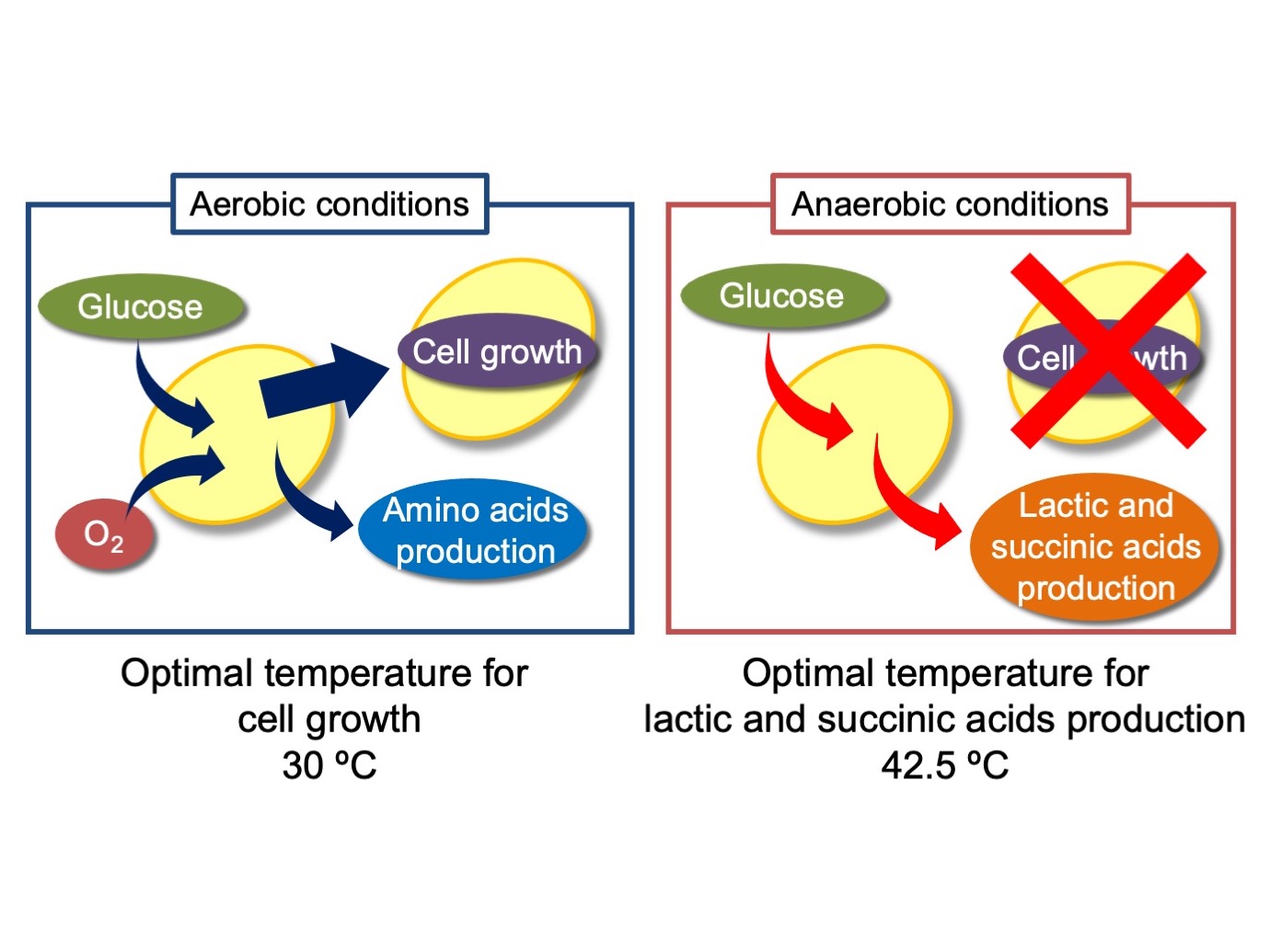Abstract:In a study published in Applied Microbiology and Biotechnology biologists at Kanazawa University report an increase in the synthesis of fermentation products in bacteria at high reaction temperatures
Mankind has long relied on fermentation—the metabolic processes within microorganisms—to procure useful compounds such as lactic acid (found in yogurt and kimchi) and ethanol (present in that daily glass of wine). Corynebacterium glutamicum is a bacterium used for industrial scale production of lactic acid and succinic acid, which can be used as bio-based plastic monomers. To-date, fermentation in C. glutamicum is conducted at temperatures of ~30°C, wherein the bacterium can grow comfortably. Now, Hikaru Mizuno and Yota Tsuge from Kanazawa University show that the production efficiency of some fermentation products can instead be magnified by simply increasing the reaction temperature above growth thresholds.
The energy producing pathway in C. glutamicum is the primary source of lactic acid and succinic acid. The researchers started their study by incubating the bacteria with glucose (the primary source of energy) and gradually raising the temperature above 30°C. Lactic acid was found to be 69% greater at 42.5°C whereas succinic acid levels were highest at 35°C and then slowly began declining.
Lactic acid and succinic acid are each produced by two different branches of glucose metabolism. Thus, enzymes, the primary regulators of any metabolic reaction, for both pathways are different. The activity of their respective enzymes at higher temperatures was then observed. Pyruvate kinase (PYK), the enzyme favoring lactic acid production showed increased activity at higher temperatures, whereas phosphoenolpyruvate carboxylase (PEPC), which oversees succinic acid synthesis seemed subdued. Indeed, changes in both products at high temperatures were a function of enzyme activity. What’s more, PYK and PEPC were competing the substrate with each other.
To understand this dynamic better, the lactic acid producing branch in C. glutamicum was shut down by inhibiting the enzyme involved, and another route to succinic acid catalyzed by pyruvate carboxylase (PYC) was enhanced. Succinic acid production was subsequently found to be 34% higher than at 42.5°C. The growth of bacteria was stalled at this temperature as expected, suggesting that the production efficiency increased even with just a fixed number of microbes. Controlling specific enzyme activities was thus favorable in increasing the production efficiency of the desired candidate.
“[W]e report that elevated temperatures, exceeding the upper limit for cell growth, can be used to increase the production of target compounds in C. glutamicum,” concludes the researchers. Optimizing fermentation at high temperatures can not only reduce the risk of contamination from other microbes but also save costs of maintaining cooler conditions. This strategy can also be tweaked to increase the efficiency of any desired product, as done for the organic acids in this case.
Background:
Fermentation – Fermentation is referred to as the energy-producing metabolic pathway in microorganisms such as bacteria and yeast. These organisms utilize enzymes to breakdown sources of carbohydrates. Lactic acid and succinic acid are examples of by-products which are formed during the breakdown of carbohydrates in certain bacteria. Since several such products are released during the energy-releasing steps, finding ways to optimize the synthesis of target products can help reduce costs and expedite the entire reaction.

figure.
The amino acid producer Corynebacterium glutamicum produces lactic and succinic acids under anaerobic conditions. This bacterium optimally grows at 30 ºC under aerobic conditions, but stops cell growth under anaerobic conditions. This study revealed that this bacterium produces lactic and succinic acids at 42.5 ºC under anaerobic conditions via modulation of enzymatic activities.
[Article]
Title: Elevated, non-proliferative temperatures change the profile of fermentation products in Corynebacterium glutamicum
Journal: Applied Microbiology and Biotechnology
Authors:Hikaru Mizuno & Yota Tsuge
DOI: 10.1007/s00253-020-11024-w
[Funder]
This work was supported by a JSPS KAKENHI Grant Number JP17K14866 and Noda Institute for Scientific Research.



 PAGE TOP
PAGE TOP